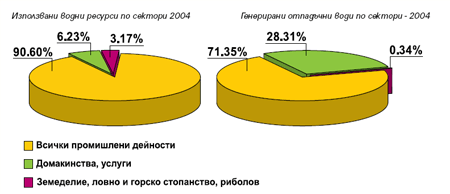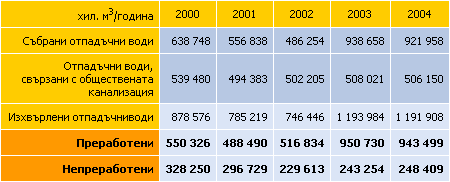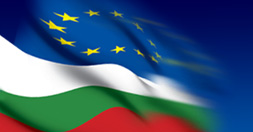|
Water abstraction
The Republic of Bulgaria is necessitous of water resources in comparison with the other European countries. Depending on the humidity of the year between 9 and 24 billion m³ per year are formed over the territory of the country.

The average annual quality per capita is at about 2300-2500 m³. With the availability of these water resources Republic of Bulgaria is among the five poorest of water countries in Europe together with Poland, Czech Republic, Belgium and Cyprus.

Only 8-10 % from the utilizable water resources of the country are used for potable and vital water supply of the settlements. Despite this, it is of a great importance the settlements to be developed and the standard of living of the inhabitants to be increased.
In the biggest part of the settlements in the country central water supply systems are built. They are described with the main parameters:
- Number of the water-supply systems - 5 031
- Per cent of the water-supply systems - 84,6%
Used water
The condition of the built sewerage systems of the settlements is not satisfactory. Most of them are constructed in the period 1960-1970. Over 20 % of them are amortized and need reconstruction. Part of them do not provide the necessary quantity of the water to the consumers and need extension and substitution.

It is necessary Waste Water Treatment Plants (WWTP) to be built up in large number of settlements in order the quality of the surface water to be improved.
Legal Framework
► National Program for Construction of Drinking Water Treatment Plants
The National Program for Construction of Drinking Water Treatment Plants (DWTP) is elaborated during 2000 by the Ministry of Regional Development and Public Works. It includes the construction of the necessary DWTPs in the settlements as well as the completion of large number water supply systems for providing supplementary quantities of water. Part of these projects are still in a process of realization, part of them have started but were not completed due to lack of funds.
With the realization of this program it is expected the quality of the drinking water to be improved and the water supply regimes to be eliminated.
► National program for construction of Waste Water Treatment Plants and sewerage systems in the settlements
In order to improve the quality of the water resources it is necessary the settlements to be provided with sewerage systems and the waste water to be treated before it is discharged in the respective basin.
In relation to this the following programs are elaborated by the Ministry of Environment and Water and the Ministry of Regional Development and Public Works in the period 1999-2001:
- National Program for Priority Construction of Urban Waste Water Treatment Plants for settlements with more than 10 000 p.e.
- National Program for Construction of Sewerage Networks and Leading Collectors to the Urban Waste Water Treatment Plants for settlements with more than 10 000 p.e.
► Strategy for Management of the Water Supply and Sewerage
The reforms in the water and wastewater sector are not finalized. Recognizing this, in March 2004 the Government of Bulgaria approved the Strategy for Management of the Water Supply and Sewerage (Strategy) which identifies the issues for the sector and presents a broad financing plan to address the investment and rehabilitation needs.
The Strategy is one of the fourth basic parts of the legal framework for the water sector in Bulgaria.
The most important objectives of the Strategy are:
- Improvement of the quality of the water and sewerage services
- Analysis of the condition of the water supply and sewerage networks
- Measures for overcoming of the problems
- Necessary investments – € 9.06 billion
- In the Strategy are defined the Main priorities in the Water Sector and their financial expression:
- rehabilitation of the water supply infrastructure in settlements – € 2,832 million;
- building of new water sources and water supply infrastructure, including dams, drinking water treatment plants, water supply networks – € 1,137 million;
- collection and treatment of waste water – € 2,962 million;
- Loans from IFIs – € 2,137 million.
The financial needs have been justified in a report by the World Bank from 2005 on the basis of the Strategy.
► Water Act
Another key element of the legal framework in the sector is the Water Act. The Water Act defines the main principles and rules for water management and introduces the river basins management principle.
The Water Act defines the responsibilities of the different institutions, as follows:
- Article 10. (1) The state policy related to activities involving operation, construction, remodelling and modernization of water development systems and facilities shall be implemented by:
- the Minister of Regional Development and Public Works - in respect of water supply and sewer systems and facilities of settlements and in respect of protection against water-related damage and loss within the limits of settlements;
- the Minister of Agriculture, Forestry and Agrarian Reform - in respect of irrigation and land-reclamation systems and facilities and in respect of protection against waterrelated damage and loss beyond the limits of settlements;
- the Minister of Energy and Energy Resources - in respect of water-power systems and projects;
- the Minister of Environment and Water - in respect of facilities for exploitation of mineral waters constituting public state property.
- (2) The policy related to activities involving operation, construction, remodelling and modernization of water development systems and facilities constituting municipal property shall be implemented by the municipality mayor.
► Water Supply and Sewerage Services Act
The Water Supply and Sewage Services Act regulates the market of the water service in Bulgaria. The law came into force on January 20, 2005 and
- Defines the main principles for economic regulation
- Defines the rules for introduction and control of the quality of the water services
- Defines the rules for determining the prices of the water services
- Establishes a State Committee for regulation of the water services
► Spatial Development Act
Defines the principles and rules for development planning of the populated areas
- Establishes rules for design, construction and operation of the public infrastructure in the populated areas
Ownership of the Water Companies
About 98% of the population is served by Vodocanal i Kanalizacia (Regional Water Companies - RWCs) which are water and wastewater utilities. A RWC is set up as a commercial company in accordance the Commercial Act. The total number of the RWCs in the country is 50 with the following ownership structure:
- 100% State - Blagoevgrad, Bourgas, Vidin, Dobrich, Pazardjik, Pleven, Plovdiv, Razgrad, Smolian, Sofia region, Stara Zagora, Haskovo, Yambol
- 51% State and 49% Municipal - Varna, Vratza, Gabrovo, Dimitrovgrad, Izperih, Kardjali, Kjustendil, Lovech, Montana, Pernik, Rousse, Silistra, Sliven, Targoviste, Shoumen, Veliko Tarnovo
- 100% Municipal - Batak, Belovo, Berkovitza, Botevgrad, Bratzigovo, Brreznik, Velingrad, Dupnitza, Kresna, Kovatchevtzi, Kubrat, Panagyuriste, Petrich, Pestera, Rakitovo, Sandanski, Svistov, Sevlievo, Strelcha
- Concession - Sofia city
The activity of the Regional Water Companies during the last 5 years shows that the quality of the services provided and the improvement of their management are determined mainly by the following factors:
- Active control by the capital owners for achievement of higher levels of serving by the RWCs;
- Creation of appropriate systems of stimulus or limits for the activity of the companies or their management in order to achieved some purposes;
- Availability of sufficient water resources in the region;
- Technology for extracting and transportation of the water to the consumers as well as construction of infrastructure;
- Qualification of the management of the companies;
- Size of the company and number of the consumers, determining the amount of the profits and the capacity for accumulation of financial resources necessary for maintenance and reconstruction of the existing water infrastructure.
Sector Background and Main Problems
About 500 000 citizens do not have 24 hours access to water. Bulgaria has also committed itself to meet EU’s environmental directives. The costs are large to provide good quality water service for all and upgrade the sewerage and wastewater services. The leaks in the water pipes can allow infiltration of contaminated groundwater or sewerage which can cause a health hazard. Infiltration of sewerage can occur especially when the water pressure in the pipes is low which happens when there is no water.
The water and wastewater sector has suffered from investment neglect for the last 15 years. During the transition period, the central government budget could not support the rehabilitation of the sector. At the same time, the level of income of the population did not allow significant increases in tariffs. Further, the efficiency of operations was not a paramount factor in the pre-transition era and this culture continued in the transition period. A combination of these factors led to inadequate service provisions, high water losses, environmental risks related to water quality and wastewater discharge, and financial difficulties for the utilities.
|

